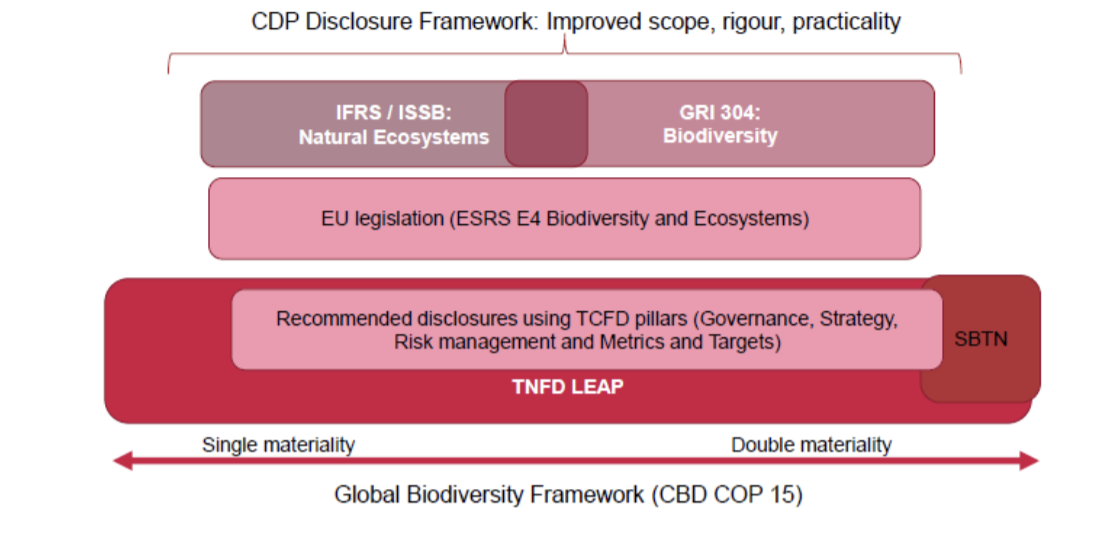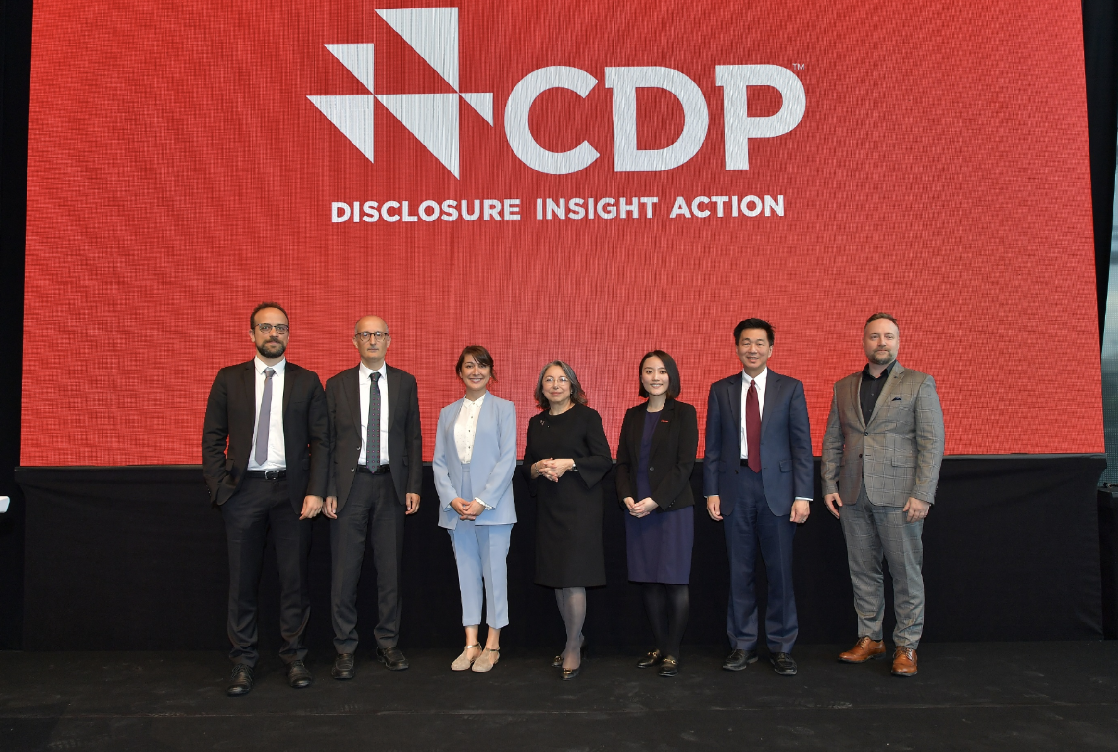About CDP
CDP is a not-for-profit charity that runs the global disclosure system for investors, companies, cities, states and regions to manage their environmental impacts. Founded in 2000 and working with more than 740 financial institutions with over $130 trillion in assets, CDP pioneered using capital markets and corporate procurement to motivate companies to disclose their environmental impacts, and to reduce greenhouse gas emissions, safeguard water resources and protect forests. The world’s economy looks to CDP as the gold standard of environmental reporting with the richest and most comprehensive dataset on
corporate and city action.
Over 23,000 organizations around the world disclosed data through CDP in 2023, including more than 18,700 companies' worth half of global market capitalization, and over 1,100 cities, states and regions. Fully TCFD aligned, CDP holds the largest environmental database in the world, and CDP scores are widely used to drive investment and procurement decisions towards a zero carbon, sustainable and resilient economy.
Alignments and Professional Engagements
CDP is a founding member of the Science Based Targets initiative, We Mean Business Coalition, ThenInvestor Agenda and the Net Zero Asset Managers initiative. In 2018, CDP redesigned its climate change questionnaire to align with the TCFD’s guidelines – specifically, we added 25 TCFD-aligned questions contained within the Governance, Risks &
Opportunities, Strategy, Targets and Emissions modules. These TCFD-aligned questions include specific methodologies for high impact sectors such as financial services, energy, agriculture, transport and materials. CDP’s alignment with the TCFD means that disclosing companies have ready-to-go material climate and natural capital disclosures that can be used for their annual reports. Many investors use CDP’s data to mitigate financial risk within their portfolios and to select which companies are best
positioned in a climate-constrained future. On the other hand the issuance of the inaugural standards, IFRS S1 and IFRS S2, by the International Sustainability Standards Board (ISSB), marks a significant milestone in the realm of sustainability-related disclosures across global capital markets. For the first time, the standards establish a shared framework for disclosing the impact of climate-related risks and opportunities on a company's future prospects.
CDP will incorporate and reinforce global baselines for all disclosers. In 2024 CDP will incorporate the ISSB climate standard. CDP has made the decision to integrate the climate-related disclosure standard developed by the ISSB into its worldwide environmental disclosure platform. This incorporation will result in a swift and extensive early adoption of ISSB climate data disclosure throughout the global economy. This strategic move will enhance the coherence of climate-related information available to investors and alleviate the disclosure burden on entities by aligning requirements.
CDP Will Launch A New Disclosure Framework On A New Technology Platform In 2024, CDP will launch a new disclosure framework on a new technology platform, delivering a significant improvement in how organizations disclose through CDP and how this helps drive climate action.
Questionnaires will be more efficient, user-friendly, and less complex. The new disclosure framework will enable companies to more easily meet the demands ahead as the global economy enters a new era of mandatory disclosure.
1. The questionnaire will be integrated across all existing themes, reducing duplication for those requested on climate, forests and water.
2. We are reducing complexity, restructuring the questionnaire so it reduces the time it takes to disclose.
3. The questionnaire will be ISSB S2 Climate Standard aligned, assisting you to get ahead of mandatory disclosure and providing benefits beyond those required by local regulation.
4. We are also introducing a dedicated SME questionnaire, aligned to how small and medium enterprises impact our planet. CDP is also currently building a modern, fit-for-purpose, scalable technology platform with an intuitive interface that will enhance user experience. The improvements will cover disclosure management, disclosing, and accessing our data.
CDP's Future: supporting disclosure for a net zero, nature-positive future In 2021, CDP launched a new strategy that expanded our horizons further still to cover all planetary boundaries. CDP’s ambition continues to grow, expanding to new areas such as biodiversity, plastics and oceans, and recognising the interconnectedness of nature and earth’s systems.
Biodiversity and plastics disclosure already piloting: - In 2021, 6 initial questions on biodiversity were placed into the climate questionnaire based on IUCN Biodiversity Planning and Monitoring Guidelines. - 5-9 questions (sector-dependent) on plastics pollution were placed into water security questionnaire based closely on theEllen MacArthur Foundation Global Commitment.

Scoring and engagement drives significant shifts in key transition indicators –from all scope of emissions reporting to ISSB aligned reporting to science-based targets (SBTs) to transition plan disclosure, with performance against SBTs being embedded into CDP disclosure. CDP is increasingly aligning with global standards and frameworks such ISSB and TNFD, as CDP did with TCFD, to provide the only global, independent, mission-driven, comparable environmental disclosure mechanism. CDP is planning to provide a mechanism and data to enable non-state actors to account for and disclose action needed to transition to a 1.5ºC, nature-positive economy. By 2025 CDP want to have an integrated questionnaire that asks questions on all relevant
environmental relationships – not just climate, water and forests. - Climate-related risks and opportunities (following TCFD –current alignment) -Nature related risks and opportunities (following TNFD and other standards such as Science-
based Targets for Nature, Global Biodiversity Framework, and others). Encompassing water (fresh and ocean), land, and biodiversity. CDP's existing Forests and Water questionnaires already cover portions of what TNFD will recommend companies disclose. CDP will prioritise and track the actions needed to nudge the stakeholders to new positions within the market-place such as Science-Based Target for Nature, Nature-related transition plan.
CDP Türkiye
Sabancı University Corporate Governance Forum (SU CGFT) is the partner organization of CDP in Türkiye. SU CGFT implements CDP Programs and supports CDP’s initiatives and campaigns as a main partner in Türkiye.
Companies responding to CDP Turkey find a chance to share their climate change policies with international institutional investors, thanks to CDP’s global reporting platform. CDP Turkey has missions such as enabling dialogue between companies, help consulting firms in terms of their visibility, support policies to reduce the effects of climate change, move environmental risk management to corporate governance level, educate and inform responding companies about possible benefits and share good
examples. CDP Turkey launched the Climate Change & Water Report 2022 and announced leader companies with the “CDP Turkey 13th Climate Change Conference and 2022 Award Ceremony” held on April 25, 2023. The opening speeches of the conference were delivered by Garanti BBVA Deputy General Manager Işıl Akdemir Evlioğlu whilst the keynote speakers of the event were Mardi McBrien, the Strategy Director of the International Financial Reporting Standards (IFRS) Foundation / ISSB, and Murat Yünlü, the Deputy Chairman of the Public Oversight, Accounting and Auditing Standards Authority (KGK).

The results of the CDP Climate Change & Water 2022 Türkiye report were announced by CDP Turkey Projects Manager Mirhan Köroğlu Göğüş. The panel discussion entitled "Evolution of Climate Change
Reporting: From Voluntary Reporting to Mandatory Reporting" took place and was moderated by Ata Can Bertay, Director of Sabancı University Corporate Governance Forum. The panelists were Ji Yeon Kim, Senior Manager of Corporate Relations from CDP, Simon C.Y. Wong, Cambridge Institute for Sustainability Leadership (CISL) Management Advisory Board member, and Tomasz Gasinski, Director of Sustainability Services from Deloitte Central Europe. To access the CDP Turkey 2022 Climate Change and Water Report, please click here.
CDP Climate Change Program
CDP believes that improving corporate awareness through measurement and disclosure is essential to the effective management of carbon and climate change risk. We request information on climate risks and low carbon opportunities from the world’s largest companies on behalf of 746 institutional investor signatories with a combined US$136 trillion in assets and 330+ major purchasers with over US$6.4 trillion in procurement spend

Each year, CDP send an invitation to the companies listed in Istanbul Stock Exchange (BIST) 100 Index to explain their climate change policies within the scope of CDP Climate Change Program. By 2022, the number of responding companies has reached 81 in Turkey. Each year, the data collected from these companies is evaluated according to CDP's rating methodology and special reports are prepared by CDP Turkey.
In 2022, 4 companies became CDP Global Climate Leaders, while 14 companies received an A- rating and were among the CDP Turkey Climate Leaders. CDP Turkey 2022 Climate Change and Water Report is available here.
CDP Water Security Program
In 2015 with the support of Garanti Bank, the CDP Water Program have been initiated in Turkey by Sabancı University Corporate Governance Forum. CDP believes that the private sector needs to take responsibility for water and encourages them to take action by offering a platform to disclose their water use and impact on water resources. To protect waterresources, CDP is acting on behalf of 680 corporate investors representing $130 trillion in assets and is calling on the world's leading companies to take action on water protection.

CDP Water Program within the scope of Turkey invited 45 companies from BIST 100 list, which are the companies in the sectors most exposed to risks associated with water. In 2022, 52 companies responded to the CDP Water Program in Turkey, up from 15 just five years ago. Find the CDP Turkey 2022 Climate Change and Water Report here.
CDP Forest Program
Unsustainable business practices and detrimental environmental effects on land, water, biodiversity, and climate change are linked to the production and supply networks of these commodities. The production and supply chains of these commodities exhibit notable business risks and adverse environmental consequences concerning land, water, biodiversity, and climate change. CDP Forests takes initiative on behalf of more than 746 investors, encompassing assets totaling over US$136 trillion, and over 280 large purchasing companies. It offers a strategic framework for companies to gauge and control forest-related
risks and opportunities, transparently report their advancements, and pledge proactive measures for forest and ecosystem restoration. Furthermore, starting in 2019, CDP initiated the collection of data pertaining to biodiversity impacts, risks,
and opportunities within the mining sector. Companies may identify and efficiently manage risks and opportunities associated with forests with the help of CDP Forests, which offers a comprehensive framework. The project supports proactive promises
to restore forests and ecosystems as well as open reporting of progress. Forests hold a central position in both our economy and the environmental challenges we confront. Neglecting to manage deforestation risks could lead to significant revenue losses for companies and financial institutions. In 2022, 60% of companies disclosing through CDP acknowledged some level of
forest-related risks. The potential financial impact of these risks averaged $330 million per disclosing company, while the projected costs of mitigation were considerably lower, at an average of just $17 million per company.

Taking action to manage these risks is crucial for companies and investors. Failure to do so could result in substantial financial losses over the next decade. Recent analysis suggests that deforestation could become a significant financial risk, akin to the risks associated with coal in financial institutions' portfolios.
Exposure to companies contributing to deforestation could leave them vulnerable to considerable financial, regulatory, and reputational risks. Please click here to read the CDP Global Forest Report 2023.
CDP Cities Program
Cities are vital in the transition to a sustainable economy. CDP helps cities disclose their environmental activities, understand their impact and take action. CDP provides the global platform for cities to measure, manage and disclose their environmental data. We work with 1100 cities measuring and disclosing environmental data each year to manage emissions, build resilience, protect themselves from climate impacts and create better places for people to live and work.

These cities are disclosing over 8,000 urban sustainability actions, demonstrating their commitment to building a sustainable economy and tackling climate change. We are nearing a tipping point in mainstreaming environmental action, and cities are at the heart of this transition. Please visit our website to reach the reports of the municipalities.


